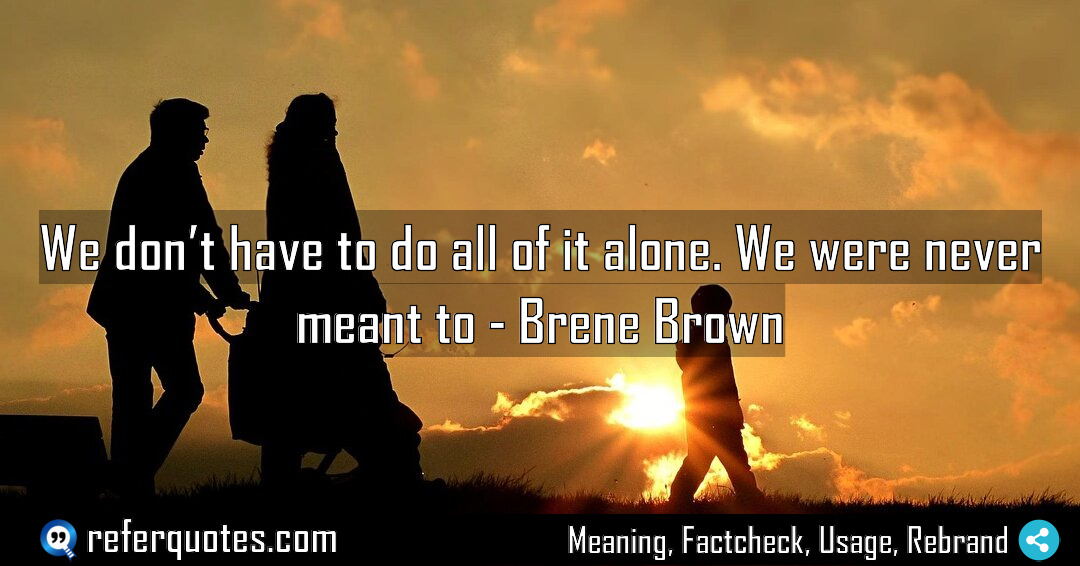
You know, that moment when you realize ‘We don’t have to do all of it alone’… it’s a game-changer. It completely reframes our struggles from a solo mission into a shared human experience, and honestly, it’s a massive relief.
Share Image Quote:
Table of Contents
Meaning
At its heart, this quote dismantles the myth of self-sufficiency. It’s a simple, profound reminder that interdependence is not a weakness; it’s our natural, intended state.
Explanation
Let’s be real. We’re all carrying something, right? A project that’s too big, a problem that feels insurmountable, a grief that’s too heavy. And our first instinct, especially in a culture that glorifies the “self-made” individual, is to buckle down and think, “I have to figure this out by myself.” But that’s the trap. Brown is telling us that this mindset is a historical and biological anomaly. We were literally built for connection, for collaboration. Leaning on others isn’t a failure; it’s an act of returning to our design. It’s how we access collective strength and wisdom we could never muster alone.
Quote Summary
Reading Level32
Aesthetic Score86
Origin & Factcheck
This wisdom comes straight from Brené Brown’s 2015 book, Rising Strong, which was published in the United States. While the sentiment feels timeless and universal, this specific phrasing is hers. You sometimes see similar ideas floating around, but this quote is correctly and solely attributed to her work on vulnerability and courage.
Attribution Summary
Author Bio
Dr Brene Brown is the author of books such as Daring Greatly and The Power of Vulnerability. The TED talk and Netflix production based on her research reached out to millions of audience. She researches effects of courage and vulnerability in shaping people's work and relationships. She leads the Brené Brown Education and Research Group and provides evidence-based insights into practical tools to help people train themselves
Official Website |Facebook | X | Instagram | YouTube |
Where is this quotation located?
| Quotation | We don’t have to do all of it alone. We were never meant to |
| Book Details | Publication Year/Date: 2015; ISBN/Unique Identifier: 9780812995824; Last edition. Number of pages: 336. |
| Where is it? | Approximate page, The Revolution section |
Context
In Rising Strong, this isn’t just a nice thought. It’s the conclusion of her research into what it takes to get back up after a fall. The whole book is about the “rumble”—that messy, uncomfortable process of reckoning with our stories. And the critical finding is that we can’t rumble effectively in isolation. We need trusted people to hold space for us, to challenge our narratives, and to help us write a new, braver ending.
Usage Examples
So how do you actually use this? It’s a tool for recalibration.
- For the burned-out leader: Instead of saying “I have to have all the answers,” you start asking, “Who on my team has a piece of the solution I’m missing?” It transforms your role from a bottleneck to a conductor.
- For the overwhelmed new parent: It’s giving yourself permission to say, “Yes, please,” when a friend offers to bring over a meal. It’s accepting that the village isn’t just a nice idea; it’s a necessity.
- For anyone facing a personal crisis: It’s the courage to pick up the phone and say, “I’m not okay, and I need to talk.” It’s swapping the armor of “I’m fine” for the vulnerability of “I need help.”
To whom it appeals?
Share This Quote Image & Motivate
Motivation Score90
Popularity Score94
Shareability Score94
FAQ
Question: But isn’t asking for help a sign of weakness?
Answer: It’s the absolute opposite. It takes immense strength and self-awareness to be vulnerable enough to say you don’t have it all figured out. Weakness is pretending you’re fine while crumbling inside.
Question: How do I know who to ask for help?
Answer: That’s the key. You look for your “marble jar people”—a concept Brown talks about. These are the folks who have earned your trust through small, consistent acts of support. They’ve proven they can hold your story without judgment.
Question: What if I’m just more of an introvert and prefer to handle things myself?
Answer: Totally valid. This isn’t about becoming an extrovert. It’s about recognizing that even one or two deeply trusted connections can be your anchor. “Alone” doesn’t have to mean physically solitary; it’s the emotional state of isolation. Having that one person you can be real with dismantles that.
Similar Quotes
“The most important actions are never comfortable.” This isn’t just a line; it’s a fundamental law of high performance. It’s the uncomfortable price of admission for any meaningful result. Table…
We find meaning not in what we achieve alone… it’s a powerful shift in perspective, isn’t it? This isn’t just feel-good fluff; it’s a hard-won truth about where human satisfaction…
Owning our story and loving ourselves… sounds simple, right? But it’s arguably the toughest, most courageous work we’ll ever do. It’s about radical self-acceptance, and it completely changes the game.…
There is always time to make things right is a powerful reminder that our biggest constraint isn’t time itself, but our own hesitation. It forces you to look at your…
You know, that idea that we are hardwired for connection… it’s not just a nice thought. It’s a biological reality that explains so much of our daily struggle and success.…
